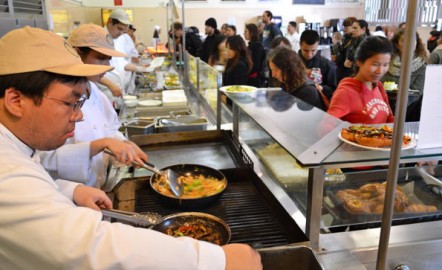OP-ED: Cafeteria May Soon Be Only A Memory

The Guardsman
Einar Sevilla
City College’s renowned Culinary Arts & Hospitality Studies program is desperately trying to raise $250,000, or it may have to close the Smith Hall cafeteria.
While much is still needed, there has been some hope. On April 30 the department received $74,700 in private donations from alumni of the program, with John Konstin, co-chair of the program’s advisory board and owner of John’s Grill, contributing $60,000.
Despite these donations, the Culinary Arts & Hospitality department is still scrambling to find ways to keep the cafeteria, as well as the department, the reputable institution it has become over the years.
If the cafeteria closes, this may no longer be true.
The city of San Francisco and the restaurant community should be doing more to keep this program alive, since it provides a major portion of the city’s culinary workforce.
And more alumni should step up and give back to help save a program that has done so much for them.
The San Francisco Chronicle reported on April 27 that, although the program generates $900,000 a year, it costs $1.6 million to run.
“I think what [City College is] trying to do is get a zero-cost out of the department,” instructor Vincent Patatore said.
The Culinary Arts & Hospitality Studies department teaches students to prepare, cook and serve food, and also offers hospitality services instruction.
For these students the cafeteria is a learning environment and not a profit-making institution. The cafeteria should not have to justify itself financially.
“I have a passion for cooking, and I actually looked for programs all over the country,” said culinary student Joe Lin. “And I found that this one . . . had the most bang for the buck.”
He says that the program “puts you above and beyond the other candidates (employers) may have for the job.”
Unlike other culinary programs in which students usually just cook for themselves and their instructors, City College’s curriculum shows students what it feels like to serve people and work at a restaurant — giving them real-world experience.
Tannis Reinhertz, Culinary Arts & Hospitality department chair, said about 80 percent of the program’s graduates leave with a job offer.
The hands-on experience provided by the cafeteria is what makes employers eager to hire City College’s culinary graduates. Eliminating this experience will put students at a disadvantage in the job market.
The cafeteria serves around 900 students a day, said Reinhertz.
“Where can I go get a protein, a starch and a vegetable for $6?” she said, referring to the lack of other healthy food options for students, staff and faculty if the cafeteria closes.
Every morning before class, I go to Smith Hall to enjoy a wonderful breakfast prepared by the City College culinary students, but now where will I eat if the cafeteria closes?
Sure, there are other places to eat around campus, but they are not nearly as nutritious or frugal, and one can only eat pizza and chinese food for so long.
The cafeteria provides cost-efficient, nutritious options for on-campus dining, which greatly benefits student and faculty patrons. But it also provides a training facility for San Francisco’s future restaurateurs, which benefits the entire community.
It is one of the most successful programs City College has to offer, and it needs to be saved.
The cafeteria is crucial to the success of the culinary program, Konstin said. Closing it, “would be a major loss for the city.”
